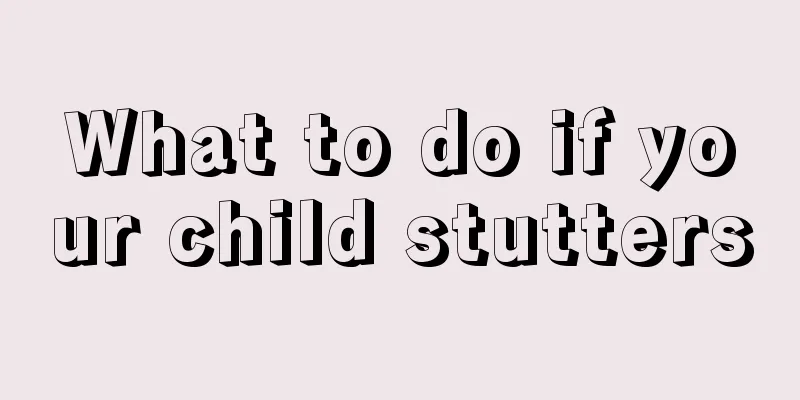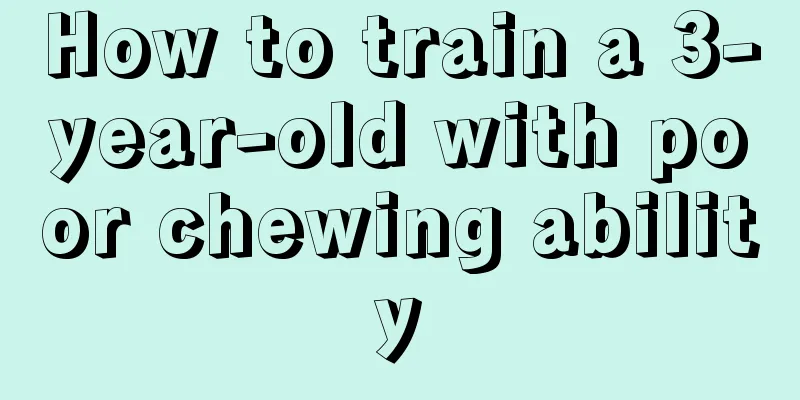What to do if your child stutters

|
Stuttering is what we often call stammering. Many times, we find it very funny to hear someone stuttering, so people with this problem have a certain degree of inferiority complex. If parents find that their child stutters, they must correct it in time. When the baby is about 4 years old, the language ability is basically normal, and the child's stuttering can be discovered at this time. If you want to improve your baby's stuttering, you still need to find out its cause. Stuttering is a common behavior in children during their development, most commonly between the ages of 2.5 and 4. To correct stuttering, you should first know why you stutter. Once you know the reason, you won’t be too nervous. Causes of stuttering 1. A two-year-old child's thinking develops rapidly, and his speaking skills cannot keep up with the speed of his thinking. Often children want to express an idea using language but cannot find the right words, and stuttering occurs in the process of "finding the right words." This type of stuttering is called periodic stuttering. As language ability improves, the stuttering will decrease and eventually disappear, so there is no need to worry. 2. Positive words cannot express what he wants to say, so he has to "find" the right words in his mind, so his speech is not fluent. 3. Being emotionally nervous (subject to strong stimulation, such as harsh criticism, or even beating or scolding), when "asking" about something, one uses repeated words or prolonged sounds to adjust the way one speaks, which takes time and the words spoken become intermittent, which is a kind of stuttering. 4. Imitation and amusing others may form bad habits, but it is not a disease. 5. Since you don’t want to hear your child speak “stuttering words” (he used to speak fluently), you pay close attention to listening to him and correcting his pronunciation. This gives your child more opportunities to hear “stuttering words” and makes him speak more “this kind of words”. 6. The language mechanism of children aged two or three is still imperfect. When they are eager to express their thoughts, they are prone to speech rhythm problems. 7. Generally speaking, stuttering in children aged two or three has no direct relationship with psychological disorders. Please rest assured that stuttering is not caused by psychological disorders. What to do if you have stuttering? 1. Treat it with a normal attitude. If you are nervous, the calculations and tone of your voice will show, and your child will be hinted at and will also become nervous, and his speech will become even less fluent. 2. Never make fun of, express disgust, threaten, or even hit or scold someone. 3. When he is around, don’t talk about him with others, don’t imitate his stuttering, and protect his self-esteem. 4. Speak to him slowly and pronounce each word clearly. At the same time, ask him to speak slowly and not in a hurry. However, when he speaks with some drawn-out or repetitive tones, just listen and don't repeat yourself. Wait for him to finish speaking, and then ask him to say it again after a while. With each experience, you will be able to say the same sentence much better the second time. 5. Let your child sing before speaking. This is the method of correcting stuttering advocated by Dr. Jushichiro Naito, the Japanese god of childcare. After the child starts to speak stutteringly, say to him: "Come on, let's sing that song!" and start singing with the child (the mother and child can also sing together), singing anything, as long as he is familiar with it. After singing, ask him gently, "What did you want to say just now?" At this time, in most cases, the child will not stutter and will speak fluently. Dr. Naito also said that this method had been tried on many children with very good results. Once children have the experience of speaking without stuttering, they will gain confidence in speaking, and after repeated practice, they can be cured. 6. When the child makes a little improvement, praise him generously. This will increase his confidence in speaking normally. |
<<: Success rate of strabismus surgery in children
>>: Early stage of vitiligo in children
Recommend
Height of three-year-old girl
Although a child's height is determined by hi...
Children's brain-boosting foods
Dark leafy greens The metabolism of protein foods...
Causes of small holes in the heart of newborns
After every newborn is born, regular physical exa...
The child cannot speak at the age of three_The child is almost three years old and still cannot speak?
Babies generally go through many stages in their ...
Treatment for baby's fever every afternoon
I wonder if your children often have a fever ever...
Baby's fever is to increase resistance
It is a very common phenomenon in life that babie...
Newborn baby belly button bleeding
If a newborn baby has bleeding in the navel half ...
What should I do if my child doesn’t eat well? These methods can help you
Many children do not know how to eat well, which ...
How to treat chronic sinusitis in children?
Diseases in children are the most difficult to tr...
What to do if your baby's upper eyelids are swollen
Floating upper eyelids are a common symptom. Some...
What are the special treatments for baby cough?
Coughing is very common for babies. Generally, ba...
What are some common sense about children's healthy diet?
Children also need to pay special attention to th...
How to prepare children's nebulizer solution
Nebulizer therapy is a popular and effective trea...
Root canal filling materials for deciduous teeth
It is actually quite common to fill the root cana...
What to do if your five-month-old baby has bad breath
The arrival of a child brings infinite joy to the...









